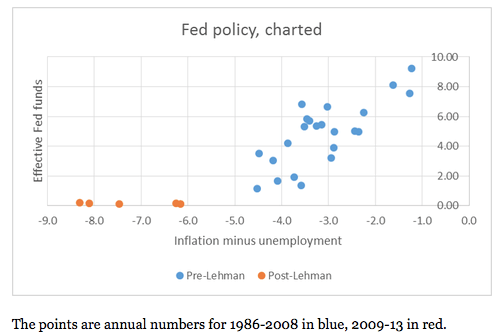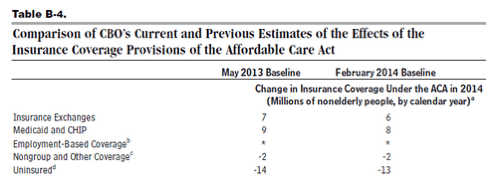Things to Read on the Morning of February 6, 2014
Must-Reads:
-
 Paul Krugman: Changing Circumstances: “You can pretty clearly see three things: 1. Until 2008, the Fed leaned against the wind…. 2. After 2008, the Fed would have liked to cut rates but couldn’t. 3. Also after 2008, as a result of the zero constraint, monetary policy no longer leaned against the wind. Point 3 strongly suggests that you would expect different results from… policies…. Some people will argue that the Fed coulda and shoulda and maybe even did make up for its inability to lower short-term rates with other policies. My view would be that making monetary policy truly effective at zero rates, if it was possible at all, would have required more radical action than the Fed was willing or politically able to take.”
Paul Krugman: Changing Circumstances: “You can pretty clearly see three things: 1. Until 2008, the Fed leaned against the wind…. 2. After 2008, the Fed would have liked to cut rates but couldn’t. 3. Also after 2008, as a result of the zero constraint, monetary policy no longer leaned against the wind. Point 3 strongly suggests that you would expect different results from… policies…. Some people will argue that the Fed coulda and shoulda and maybe even did make up for its inability to lower short-term rates with other policies. My view would be that making monetary policy truly effective at zero rates, if it was possible at all, would have required more radical action than the Fed was willing or politically able to take.” -
Josh Barro: CBO Report Obamacare Discouraging Work: “The law will reduce work hours through several mechanisms, some of which are desirable and some of which aren’t…. The decline in work will be almost entirely because people choose to work less, not because employers choose to hire less. Republicans tend to talk about Obamacare as ‘forcing people into part-time work’. But CBO expects the law to have ‘small or negligible’ effects on labor demand…. While a decline in labor demand will tend to reduce wages, a withdrawal of labor supply may actually help push them up…”
-
Dylan Scott: The GOP Has It Wrong: Obamacare Won’t ‘Cost’ 2 Million Jobs: “The CBO… undermines that [Republican] claim. Those lost hours will ‘almost entirely’ be the result of people choosing to work fewer hours…. The report explicitly says that Obamacare isn’t going to force businesses to cut jobs on any grand scale. What it is going to do is change how much Americans work. ‘I think it’s important to distinguish between people choosing to work less and jobs being lost’, Larry Levitt, vice president at the non-partisan Kaiser Famiy Foundation, told TPM. ‘That is something important to keep an eye on, since you don’t want to discourage work. But, it’s not in all cases a bad thing’.”
-
Jonathan Chait: Obamacare, Jobs, and ‘What Matters Politically’: “Imagine that the United States had a national health-care system in place for long enough that it was no longer the subject of frenetic controversy…. Now imagine a new president just proposed to eliminate that system…. Then suppose the Congressional Budget Office analyzed the effect…. Would the firestorm… about Obamacare killing jobs that dominated the actual news yesterday be, in this imagined world, a heavenly chorus of hallelujahs?… There would be more people working, more economic output, and more national wealth. Hooray!”
-
 Paul Krugman: CBO: ACA OK – NYTimes.com: “What with the fuss over the CBO estimates of employment effects of health reform–Appendix C–everyone seems to have overlooked Appendix B…. How has the disastrous initial rollout affected CBO’s projections about reform’s near future?…. The number of uninsured will fall 13 million, not 14 million!… CBO thinks that reform has been only mildly set back by the healthcare.gov mess… [and] these are predictions we’ll be able to test in real time, unlike the labor force estimates, which will get lost in statistical noise.”
Paul Krugman: CBO: ACA OK – NYTimes.com: “What with the fuss over the CBO estimates of employment effects of health reform–Appendix C–everyone seems to have overlooked Appendix B…. How has the disastrous initial rollout affected CBO’s projections about reform’s near future?…. The number of uninsured will fall 13 million, not 14 million!… CBO thinks that reform has been only mildly set back by the healthcare.gov mess… [and] these are predictions we’ll be able to test in real time, unlike the labor force estimates, which will get lost in statistical noise.”
Should-Reads:
-
Ed Kilgore: Stuck in the Middle With You by Ed Kilgore: “For anyone spending time in the actual country, it’s been obvious for a while that the renewed interest in economic inequality hasn’t flowed from government reports or anybody’s statistics, but from the very clear feeling that the recent and ongoing ‘recovery’ is benefitting one portion of the population and leaving an even larger part farther behind… good times for people with secure upper- and even upper-middle-class incomes and assets…. Nobody’s more aware of this than the retail industry, which is tailoring its offerings to the New Affluent…”
-
Karl Smith: Working for the coverage: “A big part of why Obamacare decreases employment is because it allows people to quit jobs they only still have because they are afraid of losing insurance. These folks are also likely to either have a major health issue or be caring for a family member with one, which is why health insurance was so important. We can’t help then, but see a special humanity in giving these workers the option to reduce their hours below full employment or to stop working altogether. Without these workers, the economy will be smaller. The tax rolls will be thinner. There will be a greater burden for the rest of us to shoulder. Yet it’s a burden we’d hope someone would be willing to shoulder, should we or our loved ones need it one day.”
-
Adam Levitin: Postal Banking: Maybe Not So Crazy After All: “A recent white paper by the U.S. Postal Service’s Office of the Inspector General floated the idea of introducing postal banking services as a means of expanding financial inclusion. Not surprisingly, the banking industry has rushed to condemn the idea—which would create new competition for financial services—as sort of creeping socialism. But when one considers postal banking more carefully, the idea isn’t so crazy, although it raises a number of real questions and challenges. First, the idea of a postal bank is not new to the United States…”
-
Cardiff Garcia: Participation rate hysteresis, labour market slack, and why it doesn’t have to matter: “Even if labour markets are as tight as suggested by the unemployment rate, for policy it still shouldn’t have to matter, not anytime soon. The Fed has the option of simply accepting the uncertainty and adjusting its policy in response to it…. 1. Higher inflation and expected inflation, and a signal that the Fed will tolerate both, would have immediately beneficial properties. If the labour market really is close to full employment, then wages will soon start climbing–and the Fed should let them…. And if the slack in the labour market turns out to be understated by the unemployment rate, the markets will increasingly realise that the Fed’s projections for when to start lifting rates are believable…. ‘Structural’ does not equal ‘irreversible’…. Longer-term secular forces… are pushing in the… opposite direction as they were in the 1970s. These forces are anti-inflationary. The Fed is therefore even less likely to lose control of medium-inflation expectation than already it was…”
-
José De Gregorio: How Latin America Weathered the Global Financial Crisis
- Jonathan A. Schwabis: An Economist’s Guide to Visualizing Data
Sophie Novack and Stephanie Stamm: Where Obamacare Is and Isn’t Working, and Why | Martin Wolf: If Robots Divide Us, They Will Conquer | Dylan Scott: The Best Of The Bad Reporting On Obamacare, The CBO And Jobs | Gwynn Guilford: Climate change is slowly but steadily cooking the world’s oceans | Erik Wemple: The media’s massive revisions on CBO-Obamacare story | Robert Reich: Why Widening Inequality is Hobbling Equal Opportunity |
Should Be Aware of:
-
Russell Brand: My life without drugs: “Peter Hitchens is a vocal adversary of mine on this matter. He sees this condition as a matter of choice and the culprits as criminals who should go to prison. I know how he feels. I bet I have to deal with a lot more drug addicts than he does, let’s face it. I share my brain with one, and I can tell you firsthand, they are total fucking wankers. Where I differ from Peter is in my belief that if you regard alcoholics and drug addicts not as bad people but as sick people then we can help them to get better. By we, I mean other people who have the same problem but have found a way to live drug-and-alcohol-free lives. Guided by principles and traditions a programme has been founded that has worked miracles in millions of lives. Not just the alcoholics and addicts themselves but their families, their friends and of course society as a whole.”
-
Colin Schultz: It Takes Just Five Seconds to Find Out If You’re a Good Liar: “Draw a capital Q on your forehead…. Draw it so it appears properly for others and it suggests a heightened sense of self-awareness, a focus on how you’re being perceived by others…. Researchers showed that there actually is a link between self-awareness and deceptive ability. ‘Actors with high private self-awareness were more effective deceivers…. Self-awareness may lead to knowledge of another’s mental state (i.e., Theory of Mind), which may improve an individual’s deception ability’, they write. But the test in the video is an old one, dating to a 1984 study by psychologist Glen Hass.”
-
Paul Krugman: Employees Get To Vote, Too?: “This is kind of funny: Eric Cantor feels the need to explain to his fellow Republican legislators that most Americans not only don’t own their own businesses, they have no desire to own their own businesses. It’s a message he’s apparently having a hard time getting across. But I’m surprised that none of the commentary I’ve seen mentions Cantor’s own infamous tweet on Labor Day 2012, when he took the occasion to honor… business owners: ‘Today, we celebrate those who have taken a risk, worked hard, built a business and earned their own success.'”
And:
